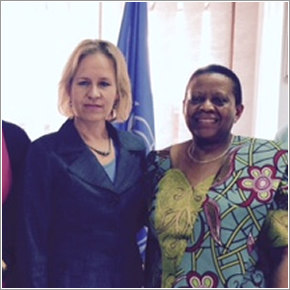From 18 to 21 May 2015, the Special Rapporteur on Freedom of Expression and Access to Information in Africa, Commissioner Pansy Tlakula, undertook an advocacy visit to the Republic of Malawi. The purpose of the visit was to meet with government officials and other stakeholders, to advocate for the adoption of an access to information law in accordance with regional and international standards on access to information as embodied in the Model Law on Access to Information for Africa (Model Law). The Special Rapporteur was accompanied during this visit by 4 expert members of the Working Group that developed the Model Law.
During her mission, the Special Rapporteur met with the Minister of Information, Tourism and Civic Education, Honourable Kondwani Nankhumwa, and the Minister of Justice and Constitutional Affairs, Mr Samuel Tembenu. In Parliament, the Special Rapporteur and her delegation met with the Speaker of Parliament, Honourable Richard Msowoya. The delegation also met the Chair and members of the Committee on Media and Communication, as well as the Chairs of several other Committees of Parliament. Other government institutions visited during the mission, are the Malawi National Human Rights Commission, the Office of the Ombudsman, and the Malawi Law Reform Commission.
The Special Rapporteur and her delegation also met with a broad spectrum of civil society organisations (CSOs) on 20 May. The purpose of this meeting was to brief these organisations on the outcome of her meetings with governmental officials and together with these CSOs, formulate strategies for sustained advocacy to ensure the speedy adoption of the draft Access to Information (ATI) Bill which is currently before the Ministry of Information. There was also a meeting with the United Nations Resident Coordinator for Malawi, Ms Mia Seppo.The mission ended with a press conference on 21 May.
In all, the both the Ministers of Justice and the Minister on Information as well as the Speaker of Parliament and the Chair of the Committee on Media, Information and Communications, where confident that the draft ATI Bill will be presented to and adopted by Parliament before the end of the year. In addition, institutions such as the National Human Rights Commission, the Ombudsman and the Law Reform Commission, pledged to actively support to the process for the adoption and more importantly, the implementation of the ATI Bill, once enacted. In return, the Special Rapporteur also committed to providing ant further technical assistance that may be required in the enactment of the Bill into law and thereafter, its effective implementation.
This advocacy mission is part of a three phased project funded by the United Nations Democracy Fund (UNDEF) being implemented by the Centre for Human Rights on behalf of the Special Rapporteur. The second phase of the project, which this visit falls under, involves advocacy visits by the Special Rapporteur to 5 selected African countries with existing or proposed Bills on access to information, to meet with high-level government officials to encourage the speedy adoption of an access to information law, which conforms to the Model Law.


